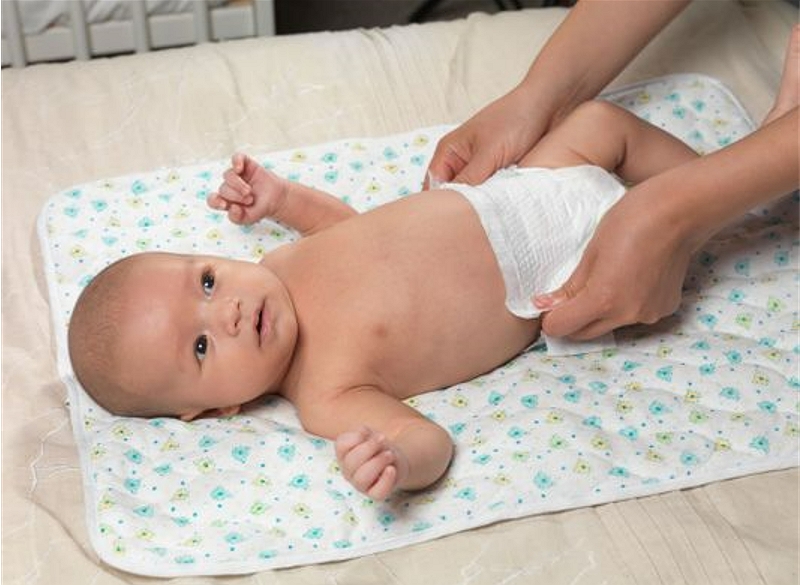What are baby diapers made of? According to the American Academy of Pediatrics, disposable diapers are made from plastics and superabsorbent polymers. In addition, they can contain sodium polyacrylate granules that absorb up to 300 times their weight in liquid.
Even so, researchers have found trace amounts of this chemical inside babies’ bodies after a day or two following diaper changes. This has caused concern over potential health effects on infants exposed to these chemicals for long periods of time with repeated use of disposable diapers.

However, studies show no known negative side effects occur when used as directed by either manufacturers or physicians. It is important to note that any exposure through inhalation or ingestion would be minimal due to natural diuresis (ination) occurring daily within hours of a diaper change.
How often should a diaper be changed at night?
There is no one-size-fits-all answer to this question, as the frequency with which a diaper should be changed at night will vary depending on the age and wetness level of the child.
However, most experts agree that diapers should generally not be left on for more than 12 hours at a time. If your child is wetting through their diaper in the middle of the night, you may need to change them more frequently. Always consult your pediatrician if you have any questions or concerns about how often your child’s diaper should be changed.
If you are using disposable diapers, it is important to note that they can become heavy and uncomfortable for a child if they are left on too long. In addition, leaving a wet diaper on a child can cause skin irritation. If you are using cloth diapers, it is important to make sure that they are sufficiently dried between changes, as wet cloth diapers can lead to yeast infections in the baby’s genital area.
Whichever type of diaper you are using, it is always important to keep an eye on your child’s diaper rash and consult with your pediatrician if you notice any signs of irritation.
Diaper rash can be caused by many different factors, such as urine or feces exposure, moisture buildup, and fungal overgrowth. If your child’s diaper rash does not improve after switching to a new brand of disposable diapers or increasing the frequency of cloth diaper changes, then you may want to consider taking them to the doctor.
When to stop changing diapers at night
There is no one answer to this question as all babies are different. However, there are general guidelines that can help you make the decision.
Most pediatricians recommend stopping diaper changes at night when a baby reaches between 12 and 18 months old. This is because most babies will start to sleep through the night by this age and will not need their diapers changed during the night.
However, some babies may still need their diapers changed during the night up until they turn two years old or even older. If your baby falls into this category, don’t be afraid to continue changing them during the night. As long as your baby is comfortable and not wetting or soiling their bedding too often, there is no harm in continuing this routine.
If you do decide to stop changing your baby’s diapers at night, be sure to give them plenty of notice before taking this step so that they can become accustomed to the new routine. You may also want to start putting a protective cover over their sheets and mattress pad in order to help protect against accidents during the night until they get used to not having diaper changes anymore.
When you think it is time for your child’s nighttime diaper changes or if there are physical signs of readiness such as potty training , then discuss with your pediatrician whether stopping these practices will work best for everyone involved. If you feel like something else might work better than what has been recommended here, make sure you ask about all other options before making any decisions.
When should I be concerned about wet diapers?
In babies who are exclusively breastfed, the color of your baby’s urine is a good indicator. If it becomes too dark or if there is a strong odor to the urine then you should call your doctor. In formula fed infants, pay attention to how often they eat and drink because this can also affect their wet diapers.
However most pediatricians will tell parents that in most cases between six to eight wet diapers each day for an infant under two months old is considered normal.
You may want to keep track on paper so that you don’t forget what you have observed over time about when your child has bowel movements, eats meals and drinks fluids throughout the day as well as when he urinates during diaper changes since these factors tend to inter-relate.
If you are concerned about your baby’s wet diapers, it is best to speak with your doctor in order to rule out any treatable causes of the problem such as dehydration or infection.
They may ask you detailed questions which will help them determine if their diaper output falls within an appropriate range for your infant’s age and weight category.
Your doctor might also recommend that they perform a physical examination just so that he can be certain that there isn’t anything else going on besides too many wet diapers each day due to urination alone.
